The Electronic Text Corpus of Sumerian Literature
(Texts: All Artifacts, Color Coding, & Writings in Bold Type With Italics Inside Parenthesis, are Added by Editor R. Brown, not the Authors, Translators, or Publishers!)
(gods in blue…mixed-breeds in teal)
1-3. “Arise and get on board, arise, we are about to sail, arise and get on board!” —
Woe, weep for the bright daylight, as the barge is steered away! —
“I am a young man! Let me not be covered against my wishes by a cabin,
as if with a blanket, as if with a blanket!”
4-10. Stretching out a hand to the barge, to the young man being steered away on the barge,
stretching out a hand to {my young man Damu (Bau‘s son)}
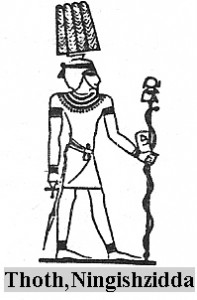 (Ningishzidda, son to Enki & Ningiridu, god of knowledge)
(Ningishzidda, son to Enki & Ningiridu, god of knowledge)
{(1 ms. has instead:) Lord Ninĝišzida} (Ningishzidda) being taken away on the barge,
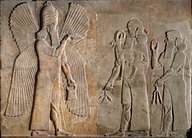 (thousands of artifacts discovered in Lagash, Ninurta‘s patron city)
(thousands of artifacts discovered in Lagash, Ninurta‘s patron city)
stretching out a hand to Ištaran (Ninurta) of the bright visage being taken away on the barge,
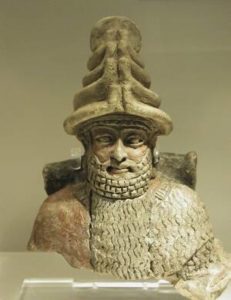 (Utu / Alla, Sun god, son to Nannar the moon crescent god of Biblical Abraham in Ur)
(Utu / Alla, Sun god, son to Nannar the moon crescent god of Biblical Abraham in Ur)
stretching out a hand to Alla (Utu), master of the battle-net, being taken away on the barge,
stretching out a hand to Lugal-šud-e (unidentified?) being taken away on the barge,
stretching out a hand to Ninĝišzida (Ningishzidda) being taken away on the barge —
his younger sister was crying in lament to him in {the boat’s cabin}
{(1 ms. has instead:) the cabin at the boat’s bow}.
11-12. His older sister removed the cover (?) from {the boat’s cabin}
{(1 ms. has instead:) the cabin at the boat’s stern}:
“Let me sail away with you, let me sail away with you, {brother}
{(1 ms. has instead:) my brother}, let me sail away with you.
{(2 mss. add 1 line:)
My brother, let me sail on your barge with you, my brother, let me sail away with you.
{(1 ms. adds 1 further line:)
Let me sail on your splendid barge with you, my brother, let me sail away with you.}}”
13-14. She was crying a lament to him at the boat’s bow: ”
{Brother} {(1 ms. has instead:) My brother}, let me sail away with you.
Let me …… for you in your boat’s stern, {brother}
{(1 ms. has instead:) my brother}, let me sail away with you.”
{(1 ms. adds 2 lines:) “The gudug priest sits in the cabin at your boat’s stern.”
She was crying a lament to him:
“Let me sail away with you, my brother, let me sail away with you.”}
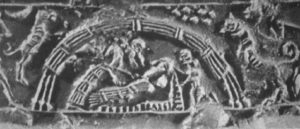 (Dr. Damu, his patient, & Damu‘s mother Bau with her guard dog)
(Dr. Damu, his patient, & Damu‘s mother Bau with her guard dog)
15-19. “My young man Damu (Bau‘s son), let me sail away with you, {brother}
{(1 ms. has instead:) my brother}, let me sail away with you.
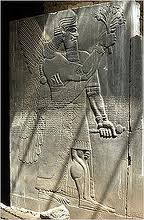 (Ninurta, son to Enlil & Ninhursag, born of the Anunnaki “double seed” law of royal succession)
(Ninurta, son to Enlil & Ninhursag, born of the Anunnaki “double seed” law of royal succession)
Ištaran (Ninurta) of the bright visage, let me sail away with you, {brother}
{(1 ms. has instead:) my brother}, let me sail away with you.
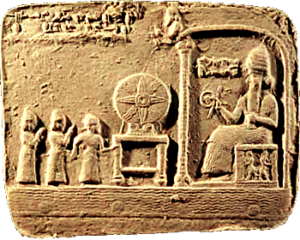 (giant alien god Utu & his wheel of justice, the alien way)
(giant alien god Utu & his wheel of justice, the alien way)
Alla (Utu), master of the battle-net, let me sail away with you, {brother}
{(1 ms. has instead:) my brother}, let me sail away with you.
Lugal-šud-e, let me sail away with you, {brother}
{(1 ms. has instead:) my brother}, let me sail away with you.
{(1 ms. adds 1 line:) Lugal-ki-bura (unidentified?), let me sail away with you,
my brother, let me sail away with you.}
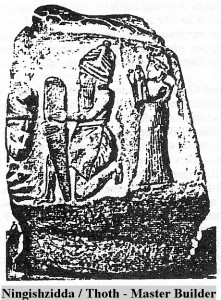
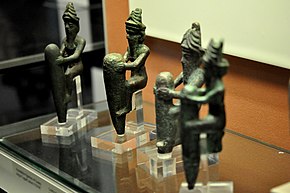 (giant Ningishzidda laid the foundation pegs to the ziggurats & pyramids found everywhere on Earth)
(giant Ningishzidda laid the foundation pegs to the ziggurats & pyramids found everywhere on Earth)
Ninĝišzida, let me sail away with you, {brother} {(1 ms. has instead:) my brother}, let me sail away with you.
{(1 ms. adds 2 lines:)
My brother, let me sail on your barge with you, my brother, let me sail away with you.
Let me sail on your splendid barge with you, my brother, let me sail away with you.}”
20-28. The evil demon who was in their midst called out to {Lugal-ki-suna} {(2 mss. have instead:) Ninĝišzida}:
“{Lugal-ki-suna} {(1 ms. has instead:) Lugal-ki-bura}, look at your sister!”
Having looked at his sister, {Lugal-ki-suna} {(1 ms. has instead:) Lugal-ki-bura} said to her:
“He sails with me, he sails with me.
Why should you sail {(1 ms. adds:) to the underworld}?
Lady, the demon sails with me.
Why should you sail {(1 ms. adds:) to the underworld}?
The thresher sails with me.
Why should you sail {(1 ms. adds:) to the underworld}?
The man who has bound my hands sails with me.
Why should you sail?
The man who has tied my arms sails with me.
Why should you sail?”
29-37. “The river of the nether world produces no water, no water is drunk from it.
{(1 ms. adds:) Why should you sail?}
The fields of the nether world produce no grain, no flour is eaten from it.
{(1 ms. adds:) Why should you sail?}
The sheep of the nether world produce no wool, no cloth is woven from it.
{(1 ms. adds:) Why should you sail?}
As for me, even if my mother digs as if for a canal,
I shall not be able to drink the water meant for me.
The waters of springtime will not be poured for me as they are for the tamarisks;
I shall not sit in the shade intended for me.
The dates I should bear like a date palm will not reveal (?) their beauty for me.
I am a field threshed by my demon — you would scream at it.
He has put manacles on my hands — you would scream at it.
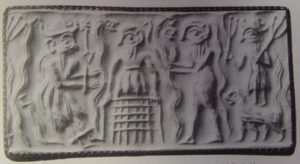 (Dumuzi the Shepherd with manacles on his hands & feet)
(Dumuzi the Shepherd with manacles on his hands & feet)
He has put a neck-stock on my neck — you would scream at it.”
38-44. Ama-šilama (Ninĝišzida‘s sister) said to Ninĝišzida:
“The ill-intentioned demon may accept something — there should be a limit to it for you.
My brother, your demon may accept something, there should be a limit to it for you.
For him let me …… from my hand the ……, there should be a limit to it for you.
For him let me …… from my hand the ……, there should be a limit to it for you.
For him let me …… from my hips the dainty lapis lazuli beads, there should be a limit to it for you.
For him let me …… from my hips the …… my lapis lazuli beads, there should be a limit to it for you.”
45-49. “You are a beloved ……, there should be a limit to it for you.
How they treat you, how they treat you! — there should be a limit to it for you.
My brother, how they treat you, how haughtily they treat you! — there should be a limit to it for you.
“I am hungry, but the bread has slipped away from me!” — there should be a limit to it for you.
“I am thirsty, but the water has slipped away from me!” – there should be a limit to it for you.”
50-54. The evil demon who was in their midst,
the clever demon, that great demon who was in their midst,
called out to the man at the boat’s bow and to the man at the boat’s stern:
“Don’t let the mooring stake be pulled out, don’t let the mooring stake be pulled out,
so that she may come on board to her brother, that this lady may come on board the barge.”
55-62. When Ama-šilama had gone on board the barge,
a cry approached the heavens, a cry approached the earth,
that great demon set up an enveloping cry before him on the river:
“Urim (Ur), at my cry to the heavens lock your houses, lock your houses, city, lock your houses!
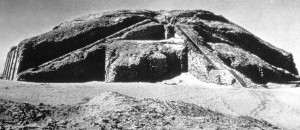 (Nannar‘s ziggurat temple residence in Ur)
(Nannar‘s ziggurat temple residence in Ur)
Shrine Urim, lock your houses, city, lock your houses!
Against your lord who has left the ĝipar, city, lock your houses!”
1 line fragmentary
approx. 1 line missing
…… a holy scepter.
…… a holy robe of office.
…… a holy crown.
…… a lapis-lazuli scepter.
70-75. He …… to the empty river, the rejoicing (?) river:
“You (addressing Ama-šilima) shall not draw near to this house, …….
…… to the place of Ereškigala (Ereshkigal).
My mother …… out of her love.
As for you (addressing the demon), you may be a great demon ……,
…… your hand against the nether world‘s office of throne-bearer.”
76-81. “My king will no longer shed tears in his eyes.
The drum will …… his joy in tears.
Come! May the fowler utter a lament for you in his well-stocked house, lord, may he utter a lament for you.
How he has been humiliated!
May the young fisherman utter a lament for you in his well-stocked house,
lord, may he utter a lament for you.
How he has been humiliated!
May the mother of the dead gudug priest {utter a lament for you in her empty ĝipar}
{( 1 ms. has instead:) , on whom the house of the palace looked with envy (?)},
utter a lament for you, lord, may she utter a lament for you.
How he has been humiliated!
May the mother high priestess utter a lament {for you who have left the ĝipar}
{(1 ms. has instead:) for you, now dead, who used to be in your ĝipar}, lord, may she utter a lament for you.
How he has been humiliated!”
82-89. “My king, bathe with water your head that has rolled in the dust.
…… in sandals your feet defiled from the defiled place.”
The king bathed with water his head that had rolled in the dust.
…… in sandals his feet defiled from the defiled place.
“Not drawing near to this house, ……. …… your throne …… to you “Sit down”.
May your bed …… to you “Lie down”.”
He ate food in his mouth, he drank choice wine.
Great holy one,
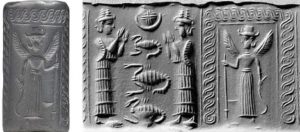 (Ereshkigal, Queen of the Under World)
(Ereshkigal, Queen of the Under World)
Ereškigala, praising you is sweet.